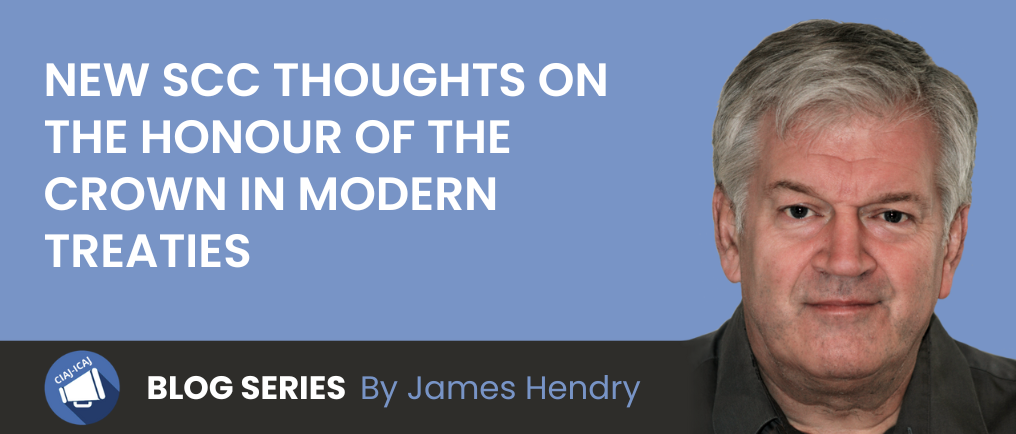New SCC Thoughts on the Honour of the Crown in Modern Treaties

This blog post is part of a series on “SCC Decisions and more” written by CIAJ’s collaborator James Hendry. Read all his posts here.
New SCC thoughts on the honour of the Crown in modern treaties
The SCC recently decided three cases interpreting historic and modern treaty promises to aid in the reconciliation of Indigenous and non-Indigenous people. I wrote about two of these. In a third, Jamal J, for the entire Court, reaffirmed that treaties must be interpreted on the ethical assumption that the Crown acted honourably when making them. He also reaffirmed that treaty interpretation must be reviewed on a standard of correctness because they are constitutional under s. 35 of the Constitution Act, 1982, and their interpretation will aid reconciliation perpetually.
In AG Ontario v Restoule, Jamal J interpreted the historic Robinson Treaties of 1850. These treaties promise an immediate payment and a perpetual annuity payable to “the Chiefs and their tribes” of the Anishinaabe peoples of Lake Huron and Lake Superior in exchange for ceding their lands to the Crown. The treaties set aside reserves and acknowledge the right to hunt and fish on ceded lands. The Treaties also contain an unusual “Augmentation Clause” giving the Crown discretion to increase the annuities in its discretion “paid to each individual” of £1 (paid in 1875) and more if the Crown derives revenue from the lands that could be shared with the Anishinaabe without loss.
The honour of the Crown
This principle is based on the theory that the Crown should act honourably in its dealings with Indigenous people in making and interpreting treaties after asserting sovereignty over their prior occupation and control of their lands (“prior sovereignty”).
How does a court apply an ethical constitutional principle that Crown officials are ethically constrained by the honour of the Crown? Like other unwritten constitutional principles, the honour of the Crown is one of the general principles in our constitutional order and is important for interpreting constitutional texts, filling gaps to give them meaning and effect. It may even restrain legislative action in s. 35 matters. In its interpretive role, the Court holds the honour of the Crown excludes unilateral Crown action or the appearance of sharp dealing. Like any constitutional principle, it offers some definition of how an honourable Crown should act should do to fill textual gaps.
The Crown must negotiate with Indigenous people by consultation and accommodation. When interpreting treaties, the honour of the Crown provides assumptions about the purposes of the Crown and how it should have acted in light of the understandings of Indigenous parties, whose own legal and governance understandings must be taken into account to achieve the true shape of the promises in the treaty. Making treaties is meant to reconcile sovereignties.
In Restoule, Jamal J reaffirms the honour of the Crown requires diligent fulfillment of the Treaty promises. He leaves the parties to negotiate a settlement subject to advice: the Crown must pay an annuity to the “Chiefs and their Tribes” involving a mandatory first increase (1875), then to exercise its discretion to decide whether it was possible to pay a further amount without loss and by how much. The Crown must exercise its discretion diligently, honourably, liberally, and justly, fostering an enduring relationship with the Anishinaabe based on their Indigenous conception of a generous leader and on shared values of respect, responsibility, reciprocity and renewal and the prior sovereignty of the Anishinaabe over their people and lands, and nation-to-nation treaty-making.
Modern treaties
The unwritten constitutional principle of the honour of the Crown applies equally to modern treaties though it will probably be invoked less often because the parties have “lawyered up.” The words of a modern treaty will attract more deference, though the honour of the Crown remains a constitutional constraint on Crown action.
The interpretive function of the honour of the Crown was less important to a clear exclusion from the governing Council of citizens who did not reside on settlement lands in the Vuntut Gwichin self-government agreement. The Court’s decision turned on its interpretation of s. 25 of the Charter which excluded the claimant’s Charter equality claim because it was based on the important Indigenous Vuntut Gwichin governance connection to its settlement lands.
Earlier, the Court agreed with the Cree Treaty party that, consistent with the honour of the Crown, the terms of the 1975 James Bay Treaty called for an exterior federal assessment when ‘required by Federal law or regulation’ on a federal subject matter in addition to the “provincial” assessment internal to the treaty where the federal assessment process would involve full Indigenous consultation.
However, the honour of the Crown constrains the Crown even where provision for consultation is made in a modern treaty. The Crown’s duty to consult the Inuit under the Nunavut Land Claims Agreement might have been met by the National Energy Board’s process for approving testing for oil and gas affecting treaty rights. But the Crown was bound to ensure consulting was done properly when the Board failed to meet its requirements in the circumstances. A tribunal carrying out deep consultations may be required by the honour of the Crown to explain how it addressed Indigenous concerns.
Also, the honour of the Crown may be satisfied by a modern treaty ensuring the required level of consultation. However, the Court held the Yukon government could not argue consultation was excluded where it was not specifically included when a duty to consult was contained in 60 other terms of the treaty. The Crown cannot contract out of the duty of honourable dealing with Indigenous people. However, in the circumstances, the notice, information, time, opportunity to present concerns and consideration given by the Minister to Little Salmon/Carmacks was sufficient.
Three First Nations with modern treaties took the Yukon government to court where its approval of a final land use plan containing significant changes was contrary to the proper consultation process fully set out in the treaties. The Court agreed the approval be quashed because the honour of the Crown was not satisfied.
Conclusion
Judges resolving ambiguities and filling gaps in historic and modern treaties may have to call on unwritten constitutional principles like the honour of the Crown help understand the agreement in words and context. Treaties must be made and interpreted to reconcile the ethical duties flowing from the Crown’s asserting sovereignty, taking into account Indigenous interests, including their existing law and governance systems that help the parties understanding treaty terms.
***Not for use as legal advice

